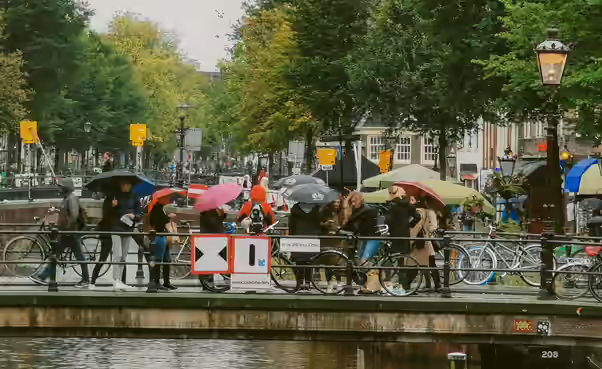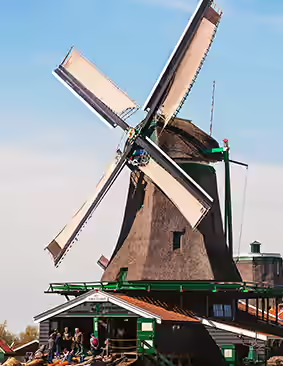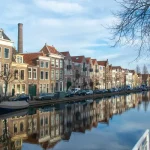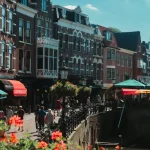
Complete guide to studying in the Netherlands
Everything you need to know about becoming an international student in the Netherlands
Five top reasons to study in the Netherlands
- Open minded and progressive society with a welcoming attitude to international students
- High quality universities that cater to either academia or vocations studies
- Central location in Europe makes it to explore surrounding European countries
- High quality of life and welfare standards
- Very affordable tuition fees for EU/EEA students
A quick introduction to the Netherlands
The Netherlands is a European country located in the northwest of Europe, bordering Germany and Belgium, and is a member of the EU.
If you’re thinking of studying abroad in the Netherlands, you are not alone. During the previous decade, the number of international students attracted to studying in the country has grown dramatically, with over 120,000 international students currently here.
Students are choosing to study in the Netherlands due to its relatively low costs of living, high quality living conditions and excellent high educational standards.
As a visitor to the country should note that whilst the Netherlands is often referred to as Holland, the terms are not interchangeable.
Holland refers to only 2 of 12 provinces of the Netherlands that have been the most economically significant to the country, and therefore historically the region of Holland became widely used as a name for the whole country.
Articles related to studying in the NetherlandsGerman students are by far the largest international student community in the Netherlands and account for 17% of the international degree students in the country. Alongside Germany, other EU countries account for large sections of the international student community with Italy (6%), Romania (6%), Spain (5%), Poland (4%) and Bulgaria (4%) being the largest communities.
Outside of the EU, the Netherlands is particularly popular with students from China (5%), India (3%), Türkiye (2%) and the USA (1.5%). There are also strong links between the Netherlands and Indonesia which sees a large community from Indonesia in the country (over 1,800 students in 2023).
The Netherland’s higher education system
The Netherlands higher education system adheres to the three-cycle degree system that is used throughout the European Higher Education Area. So this means that Dutch universities offer a wide range of degree options at the bachelors, masters levels, and at research universities, doctoral level.
Most of the universities in the Netherlands are public universities, which receive their funding from the government, whilst there are also several private universities, including the Nyenrode Business University.
Universities in the Netherlands generally fall into two categories:
Universities of applied sciences (UAS)
Known as hogescholen in Dutch, Universities of Applied Sciences focus on providing their students with both theoretical education and the practical knowledge of how to apply their studies to a practical work based environment.
This style of education is known as higher professional education, hoger beroepsonderwijs in Dutch, which is abbreviated to HBO.
If you like the idea of a more hands on method of learning, then studying at a UAS in the Netherlands could be for you. Part of the preparation for a future career will often involve placing work placements or internships during your degree course. Upon graduating, you will be ready to jump straight into your chosen profession.
There are 36 UAS in the Netherlands, which offer a variety of bachelors, pre-masters and masters degrees to international students, usually in the fields of arts and sciences.
Some of the top Hogeschool in the Netherlands include HU University of Applied Sciences Utrecht, Amsterdam University of Applied Sciences and Fontys University of Applied Sciences.
Research universities
Whilst universities of applied sciences in the Netherlands provide vocational education, research universities, known as universiteit in Dutch, place a greater emphasis on theoretical education and research. This is often referred to as a scientific education.
Research universities offer international students a choices of bachelors, masters and research degrees in a wide range of subjects.
Many of the Dutch research universities have a historical background, such as the University of Amsterdam, which was established in 1632 and University of Groningen, which was established in 1614.
We have a comprehensive list of institutions on our all universities in the Netherlands page.
University rankings
Universities in the Netherlands have a history of excellence, and many feature in the various world university ranking tables, including the University of Amsterdam, Leiden University and Wageningen University & Research.
As an international student, it is beneficial to consider how your chosen university performs in ranking tables, as they give you a good indication of the standards of teaching and research quality you can expect, along with a variety of other metrics.
For example, Times Higher Education Rankings include the percentage of international students at each university which may give you a better understanding of whether you will also meet a diverse mix of other international students whilst at that university.
Our table below shows the top 15 universities in the Netherlands.
| University | Times Higher Education World University Ranking | Best Global Universities | QS World University Ranking |
| Delft University of Technology | 48 | 187 | 49 |
| University of Amsterdam | 61 | 33 | 55 |
| Utrecht University | 46 | 105 | |
| Wageningen University & Research | 64 | 113 | 155 |
| Leiden University | 77 | 56 | 141 |
| University of Groningen | 79 | 76 | 159 |
| Erasmus University Rotterdam | 99 | 70 | 158 |
| Vrije Universiteit Amsterdam | 125 | 78 | 221 |
| Maastricht University | 138 | 179 | 230 |
| Radboud University Nijmegen | 140 | 117 | 272 |
| Eindhoven University of Technology | 168 | 374 | |
| University of Twente | 184 | 412 | 233 |
| Tilburg University | 201–250 | 631 | 347 |
See our list of the top universities in the Netherlands.
Climate
Similar to much of northern Europe, the weather in the Netherlands is probably best described as unpredictable. If you are arriving from a warm climate, you might find the climate a bit of a shock, as it can rain at any time of the year.
The locals are similar to those in the UK, in that they often enjoy complaining about the weather, and there are a lot of Dutch words to describe the rain, such as Regenen and even Pokkenweer.
But Dutch locals don’t let a bit of rain stop them, and you will hear the following saying before long, ‘You are not made of sugar, you won’t melt in the rain’.

The country does enjoy a temperate climate, which means that you will experience fairly mild winters, with little in the way of extreme cold, while temperatures in the summer remain comfortable without getting excessively hot. For example, on a very sunny summers day you will usually get maximum temperatures of between 20 – 25 degrees Celsius (68-77 degrees Fahrenheit).
Your location in the country will make a difference to the climate you experience, generally the northern provinces experience colder temperatures than those in the south. If you are located on the coast in cities such as Leiden or The Hague, you are more likely to experience a warmer summer, but the trade off is that you can expect to experience more rain in the fall.
If you like the idea of experiencing 4 unique seasons, then you will be happy to learn that spring, summer, fall and winter all offer distinct weather conditions.
Cities in the Netherlands
Lifestyle and welfare
Healthcare
One of the most attractive elements of moving to the Netherlands for your studies is the high quality of life you can expect.
Like many European countries, there is universal health coverage for all Dutch citizens, and the standard of the healthcare system in the Netherlands is very high.
As an international student, you are not legally allowed to take out public health insurance if your only purpose of residence in the Netherlands is for your studies. This means that you must either arrange for private health insurance cover, or if you are a EU-citizen, your European Health Insurance Card (EHIC) will cover you for medical costs during the period of your studies.
However, this changes if you take a part-time job during your studies, at which point you are expected to take out public health insurance.
The price of basic healthcare insurance in the Netherlands is very reasonable, you will pay around € 120 per month in you take out public health insurance, and all Dutch citizens pay the same basic premium regardless of age or health.
Leisure
The Netherlands offers its visitors a wide range of unique experiences to enjoy.
There is plenty of natural beauty for you to explore and the Flower Bulb Region is a beautiful area to visit, best enjoyed by renting a bike. Each year in Spring, the region is filled with vast fields full of colourful flowers, especially Tulips. April is the best time to visit, when the flowers will be at their best.
Whilst you may not associate the Netherlands with beaches, there are actually miles and miles of coastline to explore, with sandy beaches and bars to relax in. Popular resorts include Zandvoort, the Wadden Islands and Scheveningen.
You are likely to want to visit Amsterdam if you are not studying there, as this historical city is full of culture that attracts millions of tourists every year. Popular attractions include art galleries, museums, cruises along the canal systems, and sampling the local delicacies on offer such as raw herrings from a haringhandels (herring cart).

Beyond the inner city, you can explore the many windmills that surround the region, which historically would perform jobs such as grinding crops and even pumping water to prevent floods.
In general, Dutch people are very friendly, welcoming and open minded. Visitors may notice that the Dutch like to be very direct in their conversations, but this should not be misinterpreted as rudeness or confrontational, this style of communication is viewed as open and honest.
Transportation
Getting around in the Netherlands as a student is made easy by the excellent transport infrastructure. Trams, trains and buses are commonplace, and relatively cheap.
Public transport in the Netherlands is based on a smart card system known as OV-chipkaart. You can buy your own personal OV-chipkaart which is tied to your identity, or anonymous cards.
Both cards require you to top them up with credit, which can then be used to pay for your journeys on all types of public transport, which are charged based on the distance of your journey.
Another mode of transport that you just can’t ignore in the Netherlands is cycling, which is an incredibly popular way of getting around. You will see a constant stream of locals commuting on their classic style Dutch bikes, and it is easy to do the same yourself through local bike rental schemes, or picking up a used bike at a much lower-cost.
Food
No matter where you are coming from, most familiar food items can easily be found in the Netherlands, but what is really exciting is trying the local delicacies, which include (but are not limited to):
- Oliebollen – Traditional round warm doughnuts with raisins inside and powdered sugar on top
- Stroopwafel – Round wafers filled with syrup, particularly good when softened over a warm drink
- Friet/Patat – Depending on which Dutch people you speak to, either Friet (french fries) or Patat (chips) is the correct naming convention, but putting that aside, potato fries with toppings are an incredibly popular fast food in the Netherlands.
- Cheese – If you like cheese, then you are in for a treat, because the Dutch really like their cheese. Gouda and Edam are the most well known, but even within these two products there are many variations to experience.
- Pannenkoeken – These are pancakes, which are quite similar to French crepes, albeit slightly thicker. Enjoy these with the toppings of your choice.
Safety
If safety is high on your agenda for studying abroad, you will be pleased to hear that the Netherlands is one of the safest countries to live in in the world.
According to the Global Peace Index rankings, the Netherlands is the 18th most peaceful nation in the world.
Crime rates are relatively low compared to other nations, and international students are generally welcomed by locals. In addition to this, you will find the culture very open-minded and inclusive, with a highly diverse population.
Sign up to our regular email updates with advice on destinations, universities, scholarships and everything you need to prepare for studying overseas.
Sign up to our free emails nowUniversity cities
You are spoilt for choice when it comes to choosing a city for your studies in the Netherlands, with some brilliant options all with their own unique charms and top class universities.
Here are some of the top cities to consider:
Groningen
The largest city in the northern region of the Netherlands, Groningen is a popular destination for students, with 63 out of every 1000 inhabitants in the region studying at the University of Groningen.
Nearly half of these students are international students, so you will experience a multicultural environment if you decide to study in this charming city, which was recently voted 3rd best city in Europe for quality of life.
Amsterdam
The capital of the country and most populous city in the Netherlands, Amsterdam has a lot to offer students and visitors alike, with its famous canal systems, museums and rich history to discover.
This makes it a popular destination for international students, as do its high quality universities, which include the highly ranked and historic University of Amsterdam.
Leiden
Located on the west coast of the Netherlands near Amsterdam and The Hague, Leiden offers international students its pretty historic architecture and canal systems to enjoy, along with the oldest university in the country, Leiden University, which was established in 1575.
Utrecht
The 4th largest city in the Netherlands, Utrecht is located centrally in the country, making it an important transport hub in the region.
Utrecht, like several of the cities we recommend, has a picturesque canal system to explore, along with many other attractions such as galleries, museums and castles. One of the country’s oldest and most renowned universities, Utrecht University, proves a popular destination for international students.
Rotterdam
The Netherlands’ famous port city located in the west of the country, Rotterdam is home to a large multicultural population, including a large student body.
The city was rebuilt after incurring heavy damage during WW2, resulting in interesting modernist architecture to explore.
Universities in Rotterdam that are popular for international students include Erasmus University Rotterdam and Rotterdam University of Applied Sciences.
Nijmegen
The oldest city in the country, located on the eastern border of the Netherlands and Germany, Nijmegen is a progressive city, famed for its green credentials, winner of the European Green Capital of 2018.
International students will find a warm welcome from the open minded locals, with many attracted to study at the prestigious Radboud University.
Student visas
If you are a student moving to the Netherlands from EU/EEA nations or Switzerland for your studies, you do not require a student visa.
If you are an international student, then you will require what is known as the student residence permit.
Costs of studying
Course fees
For international students outside of the EU/EEA area, tuition fees are not capped by the government, which means that they cost more than for an EU/EEA student.
Depending on your choice of university, and course, you will pay between € 8,000 – € 20,000 per year for an undergraduate degree and up to € 30,000 per year for a postgraduate degree. These fees are roughly comparable to what you might pay at a UK university as an international student.
If you are a student from a EU/EEA country or Switzerland, the costs of studying a degree in the Netherlands are quite low, capped by the government at € 2,530 per year for the 2024/25 academic year. This is the same fee that is charged to domestic Dutch students.
Living costs
The costs of living in the Netherlands are fairly typical for a west european country, they are neither particularly cheap nor expensive.
It is difficult to find accommodation as an international student in the Netherlands due to a shortage of suitable housing, so we recommend planning ahead as far as possible.
Rates vary depending on where in the country you will be living. Amsterdam tends to be the most expensive city to live in and rent can cost over € 1,000 per month.
Other cities, such as Enschede, home to University of Twente, have more availability of accommodation suitable for students, along with cheaper costs, which can be around € 325 per month.
If you are struggling to find a suitable place to live, it may be a sensible option to consider living in a smaller city nearby to your university. For example, you may have luck looking at cities like Zaandam or Almere, which are both close to Amsterdam.
Along with your OV-chipkaart to cover your transport, aim to budget for between € 400 – 500 per month to cover costs such as food/drink and your utility bills.
Scholarships
Our advice for students looking for scholarship opportunities to study in the Netherlands is to start by checking with your chosen to see what funding and support is available.
You may also wish to consider the NL Scholarship, which is for students outside the EEA who wish to study a bachelors or masters degree.
What can I study?
The range of subjects available to study at universities in the Netherlands is vast, so you will be able to find a suitable option for most subjects.
If you are interested in a vocational education to prepare you for a specific career, you should consider studying at a University of Applied Science.
If you want an academic degree, consider studying at a research university.
Bachelors degrees generally take 3 years of full time study to complete. The most common bachelor degree types you will find are BA (Bachelor of Arts) and BSc (Bachelor of Science).
Masters programmes in the Netherlands take between 1-2 years of full time study to complete, and MSc and MA programmes are common.
Research degrees such as PhD’s are widely offered by research universities in the Netherlands.
Entry requirements
Grades
Students will be expected to have achieved the equivalent of a school leaving certificate to meet entry requirements for a bachelor degree in the Netherlands, but exact entry requirements vary depending on university and course choice.
To be accepted into a masters degree course, you will typically be expected to hold a bachelors degree or equivalent in a related subject.
Languages
The official language in the Netherlands is Dutch, which is spoken by practically the whole nation. The most common second languages in the country are English and German.
We very strongly recommend that you learn Dutch regardless of the language of tuition that you choose, as doing so will not only improve your experience of studying abroad, but it will also look good on your CV and could be a valuable skill for your future career.
Study in English
It is increasingly common to find courses taught in English at universities in the Netherlands.
If you want to study in English in the Netherlands, be prepared to provide evidence of your English language ability. English language exams widely used by international students include:
- IELTS (International English Language Testing System). You will usually be expected to have achieved a score of 6.0/6.5+.
- TOEFL (Test of English as a Foreign Language). You will usually be expected to have achieved a score of 80+
- Cambridge Advanced or Pearson Test of English may also be accepted by your chosen university.
Study in Dutch
Most courses in the Netherlands are delivered in Dutch. Studying in Dutch is growing in popularity with international students, and more universities are offering programmes for students who speak Dutch as a second language.
If you are planning to study in the Dutch language, you will be expected to provide evidence of your language proficiency, with a qualification such as the Certificate of Dutch as a Foreign Language (CNaVT), which can be taken worldwide.
Many universities offer Dutch language courses that you may take even alongside your studies, which can help you to both settle in and improve your grasp of language for your main studies.
How to apply to university
The usual system for applying for a degree at a Dutch university is to register for the centralised Studielink system, which is run on behalf of the Dutch government by DUO (Dienst Uitvoering Onderwijs).
Once you have registered your interest in a particular program or a selection of courses in your Studielink account, you may then also be required to complete an online application form through your chosen university.
Numerus Fixus
In Dutch universities, some courses are classed as numerus fixus programmes, which means that the places available on these programmes are limited to a certain number. This is usually applied to very popular degree programmes where there is a very high demand for places from students.
You should check before you make your application whether your chosen programme is classified as numerus fixus, as you are only allowed to apply to 2 such programmes in an academic year, or 1 in the case of certain subjects such as Medicine and Dentistry.
Selection processes for applicants to numerus fixus programmes are decided by the institution, who will let you know, usually via Studielink, if your application has been accepted and you’re offered a place. If this is the case, you are then expected to accept the offer or decline it promptly via Studielink, or your place will be offered to another applicant.
Job prospects for international graduates
If you plan to work in the Netherlands after you graduate, your chances of finding employment will increase if you are able to speak Dutch.
Certain degree types will also make a difference to your chances, such as jobs within the education sector if you have studied for an education degree.
If you are a citizen from within the European Economic Area (EEA) or from Switzerland, you are permitted to live and work in the Netherlands with only a few formalities required.
Alternatively, you can apply for a residence permit for an orientation year after graduating from your studies.
Frequently asked questions
Is it free to study in the Netherlands?
No. Public universities charge a capped tuition fee of € 2,530 per year to students from within the EU/EEA country or Switzerland. Students outside these regions will pay higher tuition fees.
Am I allowed to work while I study?
Yes. You are permitted to work part-time during your studies as an international student in the Netherlands.




